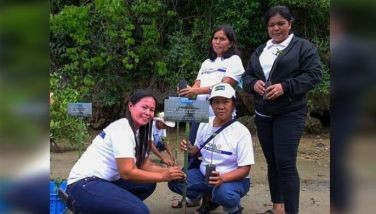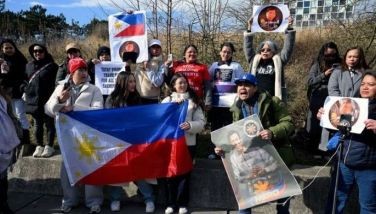Balikatan 2017 to focus on terror threat
MANILA, Philippines - This year’s Balikatan exercise between US and Philippine military forces, while veering away from the usual focus on territorial defense and maritime security, is timely and will put more attention on the global threat of terrorism.
Defense Secretary Delfin Lorenzana said the joint military exercise for 2017 is “different” but is actually “more special” because it will concentrate on humanitarian assistance, disaster response (HADR) and counterterrorism.
“I think we have to devote more resources and time to this kind of activity and also to counterterrorism,” he said during the opening ceremony of the Balikatan exercises in Camp Aguinaldo yesterday.
US Ambassador Sung Kim described this year’s exercises, set to run from May 8 to 19, as proof of the strong military partnership and friendship between the two nations.
He said American and Filipino soldiers would learn a lot from the activities that have been lined up to “help save lives and rebuild devastated communities.”
“But from my perspective, it’s more than that. Balikatan has a very special meaning for the embodiment of our robust bilateral relationship and reflects not only our strong military partnership but also the deep friendship between our two peoples,” Kim added.
Lorenzana related that he has talked with the defense ministers of China, Russia and those of the Middle East and all their concerns centered on terrorism.
“I think it’s a global threat. I think America is also buckling both at home and abroad. And so this year’s exercise provides both the Armed Forces of the Philippines and the US armed forces the necessary capability training in responding to disasters and rescue operations during crisis and meeting the challenges of violent extremism,” he stressed.
Balikatan 2017 will involve the participation of 2,600 US soldiers and 2,800 Filipino soldiers who will work together in addressing a disaster scenario wherein a super storm hits the country and devastates Metro Manila.
For Kim, the HADR and counter-terrorism focus would allow the US and Philippine military forces to deliver a much stronger response to challenges and react more quickly and effectively.
He said American and Filipino soldiers would be “training shoulder to shoulder, as friends, partners and allies” and along the way “build trust and relationships that will help them deal effectively together with the full range of challenges here in the Philippines and beyond.”
Balikatan exercise directors Lt. Gen. Oscar Lactao of the AFP and Lt. Gen. Lawrence Nicholson of the US armed forces both explained that while the previous exercises focused on territorial defense and maritime security, they also follow the directions of political and civilian leaders to give importance to humanitarian exercises.
AFP chief of staff Gen. Eduardo Año said the alliance between the Philippines and the US has “withstood the test of time,” adding that despite the shift, the exercises have been an avenue to enhance the cooperation between the two military forces, mutually developing teamwork.
He noted that recent global and local events, like the tornado outbreak and floods that affected the Central US, have tested the preparedness of the emergency response capability of the US.
In the Philippines, he identified Super Typhoon Yolanda in 2013 and the latest typhoons that devastated the country as having left valuable lessons in disaster preparedness.
He added that the recent series of earthquakes around the Philippine archipelago has been a blatant warning of the eventual occurrence of the big one “that we hope it would not come, thus prompting us to increase our disaster readiness.”
The Philippines has recently warmed its ties with China and Russia following President Duterte’s charting of an independent foreign policy.
- Latest
- Trending



























